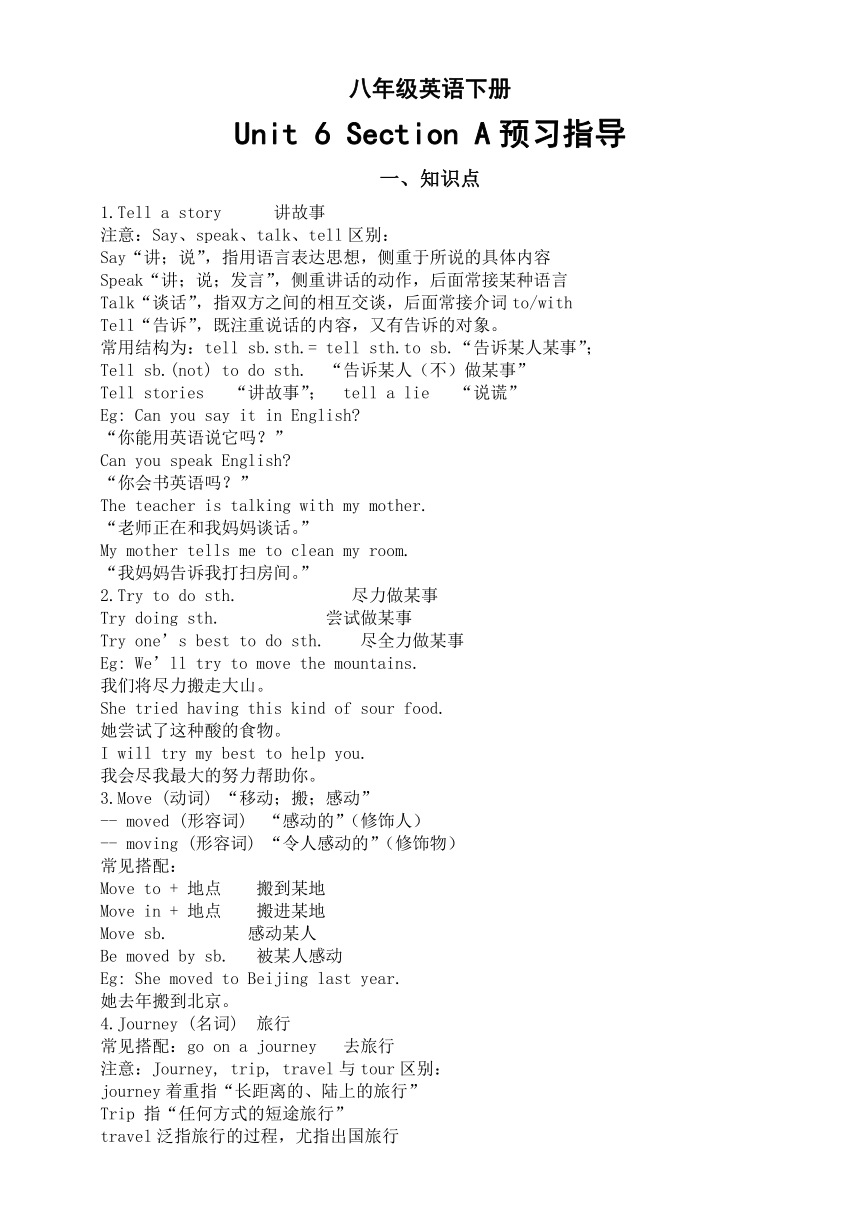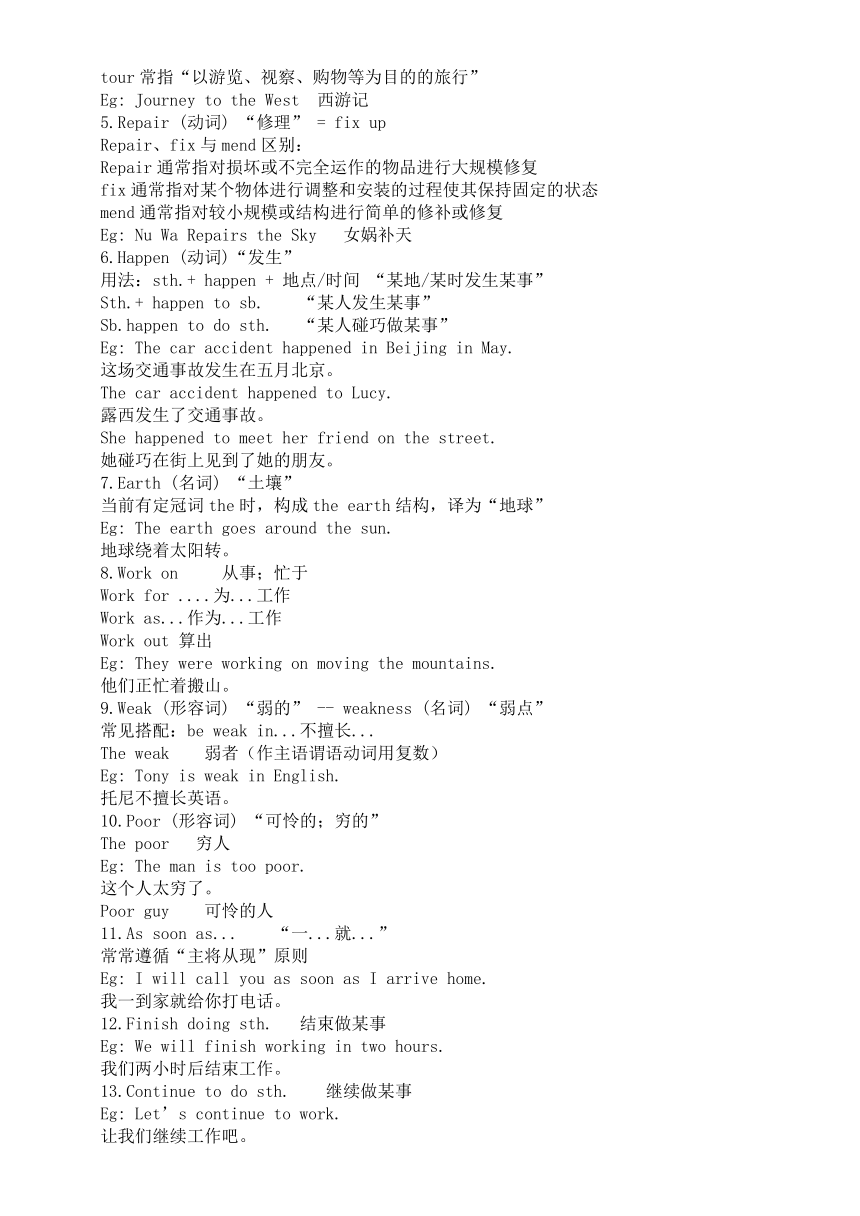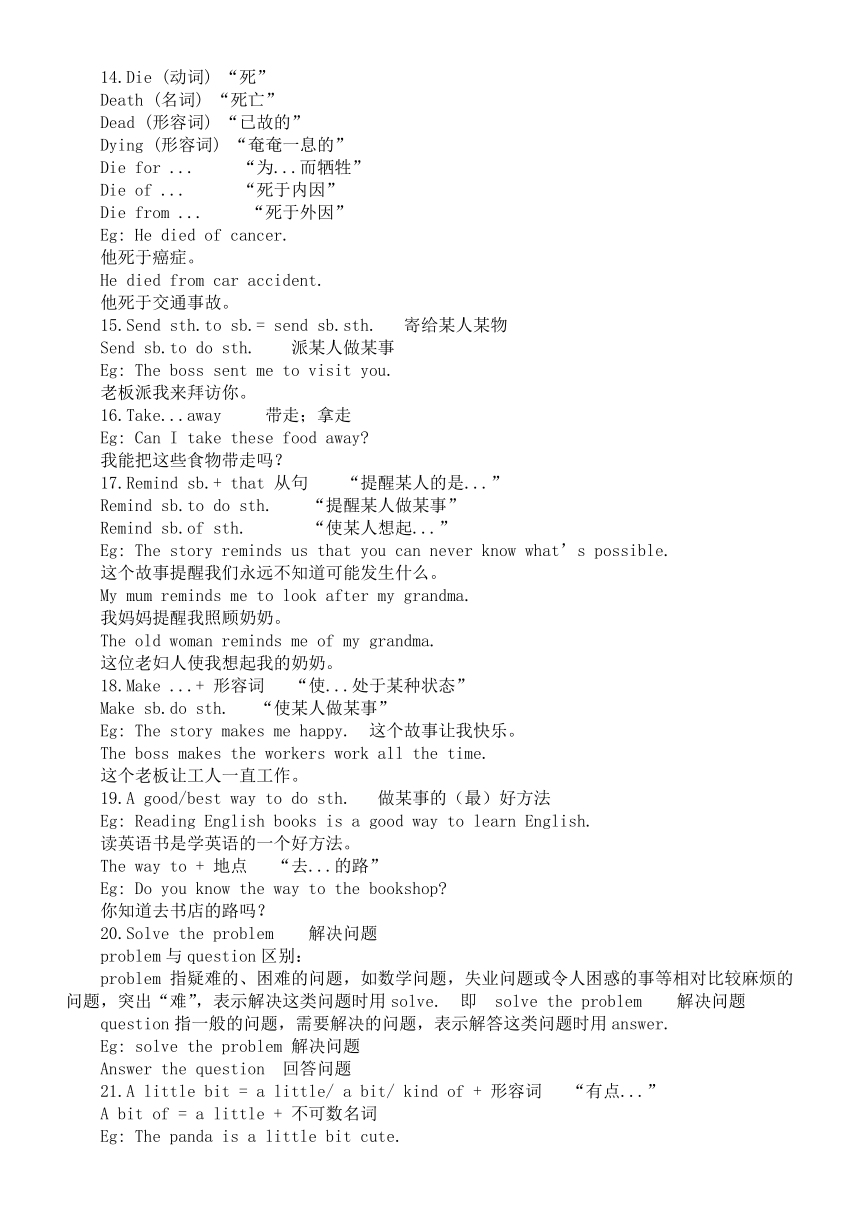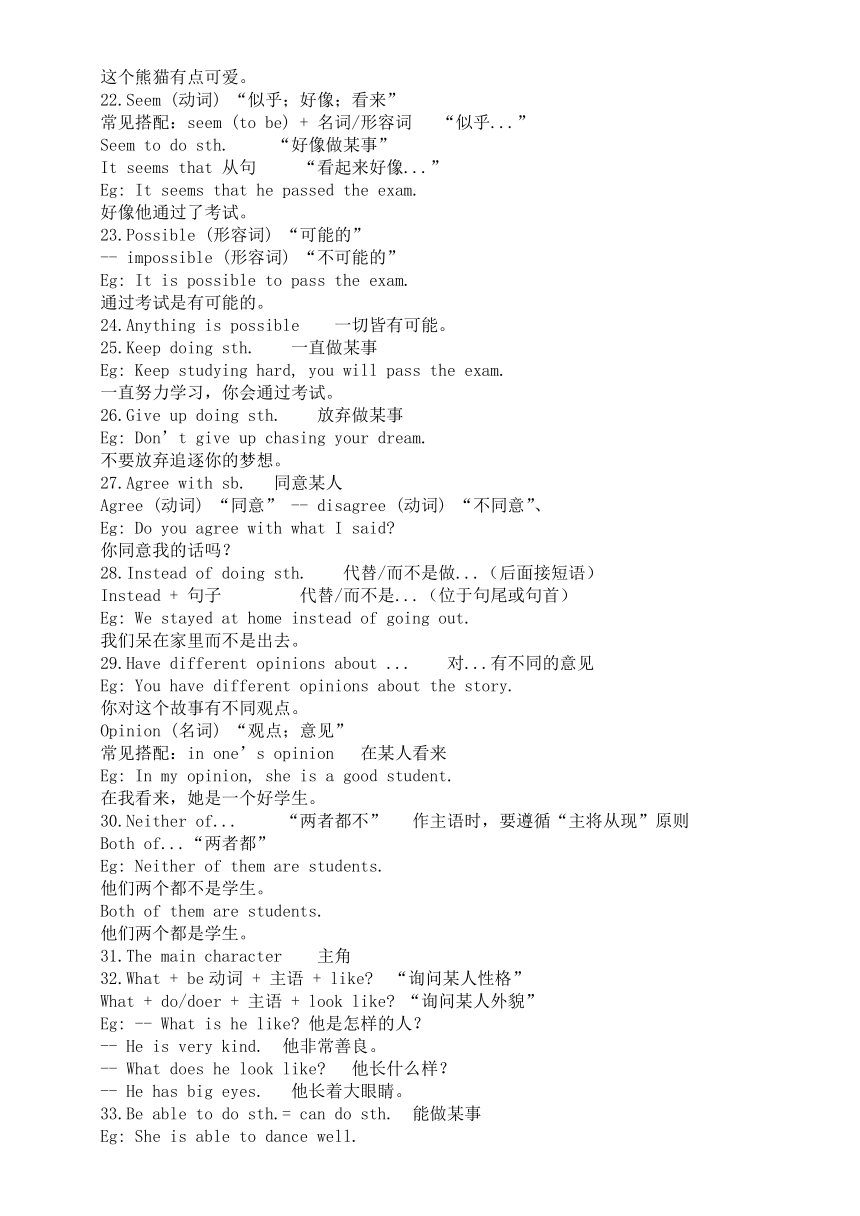Unit 6 An old man tried to move the mountains.Section A预习指导(知识点+练习题) (含答案)
文档属性
| 名称 | Unit 6 An old man tried to move the mountains.Section A预习指导(知识点+练习题) (含答案) |  | |
| 格式 | docx | ||
| 文件大小 | 39.7KB | ||
| 资源类型 | 教案 | ||
| 版本资源 | 人教新目标(Go for it)版 | ||
| 科目 | 英语 | ||
| 更新时间 | 2024-04-10 15:13:41 | ||
图片预览




文档简介
八年级英语下册
Unit 6 Section A预习指导
一、知识点
1.Tell a story 讲故事
注意:Say、speak、talk、tell区别:
Say“讲;说”,指用语言表达思想,侧重于所说的具体内容
Speak“讲;说;发言”,侧重讲话的动作,后面常接某种语言
Talk“谈话”,指双方之间的相互交谈,后面常接介词to/with
Tell“告诉”,既注重说话的内容,又有告诉的对象。
常用结构为:tell sb.sth.= tell sth.to sb.“告诉某人某事”;
Tell sb.(not) to do sth. “告诉某人(不)做某事”
Tell stories “讲故事”; tell a lie “说谎”
Eg: Can you say it in English
“你能用英语说它吗?”
Can you speak English
“你会书英语吗?”
The teacher is talking with my mother.
“老师正在和我妈妈谈话。”
My mother tells me to clean my room.
“我妈妈告诉我打扫房间。”
2.Try to do sth. 尽力做某事
Try doing sth. 尝试做某事
Try one’s best to do sth. 尽全力做某事
Eg: We’ll try to move the mountains.
我们将尽力搬走大山。
She tried having this kind of sour food.
她尝试了这种酸的食物。
I will try my best to help you.
我会尽我最大的努力帮助你。
3.Move (动词) “移动;搬;感动”
-- moved (形容词) “感动的”(修饰人)
-- moving (形容词) “令人感动的”(修饰物)
常见搭配:
Move to + 地点 搬到某地
Move in + 地点 搬进某地
Move sb. 感动某人
Be moved by sb. 被某人感动
Eg: She moved to Beijing last year.
她去年搬到北京。
4.Journey (名词) 旅行
常见搭配:go on a journey 去旅行
注意:Journey, trip, travel与tour区别:
journey着重指“长距离的、陆上的旅行”
Trip 指“任何方式的短途旅行”
travel泛指旅行的过程,尤指出国旅行
tour常指“以游览、视察、购物等为目的的旅行”
Eg: Journey to the West 西游记
5.Repair (动词) “修理” = fix up
Repair、fix与mend区别:
Repair通常指对损坏或不完全运作的物品进行大规模修复
fix通常指对某个物体进行调整和安装的过程使其保持固定的状态
mend通常指对较小规模或结构进行简单的修补或修复
Eg: Nu Wa Repairs the Sky 女娲补天
6.Happen (动词)“发生”
用法:sth.+ happen + 地点/时间 “某地/某时发生某事”
Sth.+ happen to sb. “某人发生某事”
Sb.happen to do sth. “某人碰巧做某事”
Eg: The car accident happened in Beijing in May.
这场交通事故发生在五月北京。
The car accident happened to Lucy.
露西发生了交通事故。
She happened to meet her friend on the street.
她碰巧在街上见到了她的朋友。
7.Earth (名词) “土壤”
当前有定冠词the时,构成the earth结构,译为“地球”
Eg: The earth goes around the sun.
地球绕着太阳转。
8.Work on 从事;忙于
Work for ....为...工作
Work as...作为...工作
Work out 算出
Eg: They were working on moving the mountains.
他们正忙着搬山。
9.Weak (形容词) “弱的” -- weakness (名词) “弱点”
常见搭配:be weak in...不擅长...
The weak 弱者(作主语谓语动词用复数)
Eg: Tony is weak in English.
托尼不擅长英语。
10.Poor (形容词) “可怜的;穷的”
The poor 穷人
Eg: The man is too poor.
这个人太穷了。
Poor guy 可怜的人
11.As soon as... “一...就...”
常常遵循“主将从现”原则
Eg: I will call you as soon as I arrive home.
我一到家就给你打电话。
12.Finish doing sth. 结束做某事
Eg: We will finish working in two hours.
我们两小时后结束工作。
13.Continue to do sth. 继续做某事
Eg: Let’s continue to work.
让我们继续工作吧。
14.Die (动词) “死”
Death (名词) “死亡”
Dead (形容词) “已故的”
Dying (形容词) “奄奄一息的”
Die for ... “为...而牺牲”
Die of ... “死于内因”
Die from ... “死于外因”
Eg: He died of cancer.
他死于癌症。
He died from car accident.
他死于交通事故。
15.Send sth.to sb.= send sb.sth. 寄给某人某物
Send sb.to do sth. 派某人做某事
Eg: The boss sent me to visit you.
老板派我来拜访你。
16.Take...away 带走;拿走
Eg: Can I take these food away
我能把这些食物带走吗?
17.Remind sb.+ that 从句 “提醒某人的是...”
Remind sb.to do sth. “提醒某人做某事”
Remind sb.of sth. “使某人想起...”
Eg: The story reminds us that you can never know what’s possible.
这个故事提醒我们永远不知道可能发生什么。
My mum reminds me to look after my grandma.
我妈妈提醒我照顾奶奶。
The old woman reminds me of my grandma.
这位老妇人使我想起我的奶奶。
18.Make ...+ 形容词 “使...处于某种状态”
Make sb.do sth. “使某人做某事”
Eg: The story makes me happy. 这个故事让我快乐。
The boss makes the workers work all the time.
这个老板让工人一直工作。
19.A good/best way to do sth. 做某事的(最)好方法
Eg: Reading English books is a good way to learn English.
读英语书是学英语的一个好方法。
The way to + 地点 “去...的路”
Eg: Do you know the way to the bookshop
你知道去书店的路吗?
20.Solve the problem 解决问题
problem与question区别:
problem 指疑难的、困难的问题,如数学问题,失业问题或令人困惑的事等相对比较麻烦的问题,突出“难”,表示解决这类问题时用solve. 即 solve the problem 解决问题
question指一般的问题,需要解决的问题,表示解答这类问题时用answer.
Eg: solve the problem 解决问题
Answer the question 回答问题
21.A little bit = a little/ a bit/ kind of + 形容词 “有点...”
A bit of = a little + 不可数名词
Eg: The panda is a little bit cute.
这个熊猫有点可爱。
22.Seem (动词) “似乎;好像;看来”
常见搭配:seem (to be) + 名词/形容词 “似乎...”
Seem to do sth. “好像做某事”
It seems that 从句 “看起来好像...”
Eg: It seems that he passed the exam.
好像他通过了考试。
23.Possible (形容词) “可能的”
-- impossible (形容词) “不可能的”
Eg: It is possible to pass the exam.
通过考试是有可能的。
24.Anything is possible 一切皆有可能。
25.Keep doing sth. 一直做某事
Eg: Keep studying hard, you will pass the exam.
一直努力学习,你会通过考试。
26.Give up doing sth. 放弃做某事
Eg: Don’t give up chasing your dream.
不要放弃追逐你的梦想。
27.Agree with sb. 同意某人
Agree (动词) “同意” -- disagree (动词) “不同意”、
Eg: Do you agree with what I said
你同意我的话吗?
28.Instead of doing sth. 代替/而不是做...(后面接短语)
Instead + 句子 代替/而不是...(位于句尾或句首)
Eg: We stayed at home instead of going out.
我们呆在家里而不是出去。
29.Have different opinions about ... 对...有不同的意见
Eg: You have different opinions about the story.
你对这个故事有不同观点。
Opinion (名词) “观点;意见”
常见搭配:in one’s opinion 在某人看来
Eg: In my opinion, she is a good student.
在我看来,她是一个好学生。
30.Neither of... “两者都不” 作主语时,要遵循“主将从现”原则
Both of...“两者都”
Eg: Neither of them are students.
他们两个都不是学生。
Both of them are students.
他们两个都是学生。
31.The main character 主角
32.What + be动词 + 主语 + like “询问某人性格”
What + do/doer + 主语 + look like “询问某人外貌”
Eg: -- What is he like 他是怎样的人?
-- He is very kind. 他非常善良。
-- What does he look like 他长什么样?
-- He has big eyes. 他长着大眼睛。
33.Be able to do sth.= can do sth. 能做某事
Eg: She is able to dance well.
她可以跳得很好。
34.A program called monkey 一部叫《猴子》的节目
35.Most of ... ...中大多数
Most为many/much的最高级形式
Eg: Most of these books are from my parents.
大部分书来自我的父母。
36.For the first time 第一次
Eg: You should shake hands when you met each other for the first time.
当你们第一次见到彼此时应该握手。
37.Be new to sb. 对某人陌生
Eg: Chinese children is new to this book.
中国小孩最这本书很陌生。
38.Traditional (形容词) “传统的”
-- tradition (名词) “传统”
Eg: This is a traditional custom.
这是一种传统的习俗。
39.In fact = actually 事实上
Eg: In fact, she is from the USA.
事实上,她来自美国。
40.This is because + 从句
= The reason is that ...“这是因为...”
Eg: This is because he can make 72 changes.
这是因为他会72变。
41.Change (动词) “变化” (名词) “变化”--changes (名词) “零花钱”
常见搭配:make changes to sth.对...产生变化
Change one’s mind 改变某人的想法
Eg: the change of the weather 天气的变化
42.Turn ...into ... 把...变成...
Eg: The magician turned the girl into a bird.
魔法师把女孩变成一只鸟。
43.Fight with sb. 和某人打架
Eg: Please don’t fight with others.
请不要和他人打架。
44.A magic stick 魔法棒
45.so + 形容词 + that… “如此…以至于…”
Eg: He was so angry that he couldn’t say a word.
他如此生气以至于他一句话也说不出来。
such + 名词 + that… “如此…以至于…”
Eg: He was a cute boy that everyone likes him.
他是如此可爱的男孩以至于每个人都喜欢他。
so that “以便;为了” 用来表目的,常与can, could连用
Eg: I got up early so that I could catch the early bus.
我早起为了我能赶上早班车。
46.At other times 别的时候
47.Excite (动词) “使兴奋” -- excitement (名词) “兴奋”
-- excited (形容词) “感到兴奋的”(修饰人)
-- exciting (形容词) “令人兴奋的”(修饰物)
Be excited about sth. 对...感到兴奋
Eg: She is so excited about the exciting news.
她对这个兴奋的消息如此兴奋。
48.As soon as ... “一...就...”
要遵循主将从现原则
Eg: I will call you as soon as I arrive there.
我一到那就给你打电话。
e out 出版;发芽;结果是
Eg: The book was come out in 2020.
这本书2020年出版。
50.More than = over 超过
Eg: There are more than 200 books here.
这有200多本书。
51.Become interested in doing sth. 对做某事感兴趣
Eg: She becomes interested in learning English.
她对学英语感兴趣。
52.One of + the + 形容词最高级 + 名词复数 (作主语时谓语动词用单数)
Eg: One of the most interesting movies is Hello, Mum.
最有趣的电影之一是《你好,妈妈》。
二、练习题
一、短语互译
1.Agree with ________
2.事实上 _________
3.Give up ________
4.做某事的好方法 ________
5.A little bit _______
二、根据句意及首字母或汉语提示完成单词
1.She is so w_______, we need to send her to the hospital.
2.Don’t be _______ (愚蠢的).
3.The old woman makes me r________ my grandmother.
4.The elephant has a long ______ (尾巴).
5.The dog like h_______ the bones (骨头) in its cage.
三、用所给词的适当形式填空
1.Please try _______ (get) there on time.
2.Can you finish _______ (do) your homework before dinner
3.This is a good way ______ (pass) the bridge.
4.The book _______ (call) “Journey to the West” is interesting.
5.Spring Festival is a _________ (tradition) festival in China.
四、单项选择
( )1.The movie made everyone _____ again and again.
A.laugh
B.laughed
C.laughing
D.to laugh
( )2.He had to _______ his dream because of a car accident.
A.take up
B.go on
C.set up
D.give up
( )3._____ they don’t know each other.
A.In all
B.In fact
C.In general
D.In the end
( )4.The magician can turn people ______ a bird.
A.to
B.onto
C.into
D.for
( )5.Tony is ______ nervous _____ he can’t talk in public.
A.such; that
B.too; to
C.so; that
D.not; enough
( )6.We stayed at home ______ having a picnic because of the bad weather yesterday.
A.instead of
B.unless
C.instead
D.while
五、翻译句子
1.这本书十年前出版了。
This book ______ ______ ten years ago.
2.熊猫有点儿害羞。
Pandas are ______ ______ ______ shy.
3.如果你努力,一切皆有可能。
If you work hard, ______ _____ _____.
4.愚公应该修路而不是移山。
Yu Gong should build a road ______ _____ ______ the mountain.
5.去年我第一次去了北京。
Last year I went to Beijing _____ _____ ______ ______.
六、补全对话
A: Hey, David.1._______
B: Yes, I did.
A: 2.______
B: It’s really interesting.
A: Really 3._________
B: Telling the whole story may take a long time, but I can tell you the main plot (情节).
A: 4._______
B: There were ten suns in the sky so it was very hot.People lived a hard life.Hou Yi tried his bestt to shot nine suns.
A: Did he succeed
B: Yes, he did.5.______
A: Sounds good.
A.What do you think of it
B.You could go on the Internet to know more about it.
C.How does the story begin
D.Could you please tell it to me
E.What happened to Hou Yi at last
F.Did you hear the story of Hou Yi
G.That’s OK.
附:参考答案
一、1.同意 2.In fact 3.放弃
4.the good way to do sth. 5.有点儿
二、1.weak 2.silly 3.remind 4.tail 5.hiding
三、1.to get 2.doing 3.to pass 4.called 5.traditional
四、1 -- 5 ADBCCA
五、1.came out 2.a little bit
3.Anything is possible 4.instead of moving
5.for the first time
六、1 -- 5 FADCB
Unit 6 Section A预习指导
一、知识点
1.Tell a story 讲故事
注意:Say、speak、talk、tell区别:
Say“讲;说”,指用语言表达思想,侧重于所说的具体内容
Speak“讲;说;发言”,侧重讲话的动作,后面常接某种语言
Talk“谈话”,指双方之间的相互交谈,后面常接介词to/with
Tell“告诉”,既注重说话的内容,又有告诉的对象。
常用结构为:tell sb.sth.= tell sth.to sb.“告诉某人某事”;
Tell sb.(not) to do sth. “告诉某人(不)做某事”
Tell stories “讲故事”; tell a lie “说谎”
Eg: Can you say it in English
“你能用英语说它吗?”
Can you speak English
“你会书英语吗?”
The teacher is talking with my mother.
“老师正在和我妈妈谈话。”
My mother tells me to clean my room.
“我妈妈告诉我打扫房间。”
2.Try to do sth. 尽力做某事
Try doing sth. 尝试做某事
Try one’s best to do sth. 尽全力做某事
Eg: We’ll try to move the mountains.
我们将尽力搬走大山。
She tried having this kind of sour food.
她尝试了这种酸的食物。
I will try my best to help you.
我会尽我最大的努力帮助你。
3.Move (动词) “移动;搬;感动”
-- moved (形容词) “感动的”(修饰人)
-- moving (形容词) “令人感动的”(修饰物)
常见搭配:
Move to + 地点 搬到某地
Move in + 地点 搬进某地
Move sb. 感动某人
Be moved by sb. 被某人感动
Eg: She moved to Beijing last year.
她去年搬到北京。
4.Journey (名词) 旅行
常见搭配:go on a journey 去旅行
注意:Journey, trip, travel与tour区别:
journey着重指“长距离的、陆上的旅行”
Trip 指“任何方式的短途旅行”
travel泛指旅行的过程,尤指出国旅行
tour常指“以游览、视察、购物等为目的的旅行”
Eg: Journey to the West 西游记
5.Repair (动词) “修理” = fix up
Repair、fix与mend区别:
Repair通常指对损坏或不完全运作的物品进行大规模修复
fix通常指对某个物体进行调整和安装的过程使其保持固定的状态
mend通常指对较小规模或结构进行简单的修补或修复
Eg: Nu Wa Repairs the Sky 女娲补天
6.Happen (动词)“发生”
用法:sth.+ happen + 地点/时间 “某地/某时发生某事”
Sth.+ happen to sb. “某人发生某事”
Sb.happen to do sth. “某人碰巧做某事”
Eg: The car accident happened in Beijing in May.
这场交通事故发生在五月北京。
The car accident happened to Lucy.
露西发生了交通事故。
She happened to meet her friend on the street.
她碰巧在街上见到了她的朋友。
7.Earth (名词) “土壤”
当前有定冠词the时,构成the earth结构,译为“地球”
Eg: The earth goes around the sun.
地球绕着太阳转。
8.Work on 从事;忙于
Work for ....为...工作
Work as...作为...工作
Work out 算出
Eg: They were working on moving the mountains.
他们正忙着搬山。
9.Weak (形容词) “弱的” -- weakness (名词) “弱点”
常见搭配:be weak in...不擅长...
The weak 弱者(作主语谓语动词用复数)
Eg: Tony is weak in English.
托尼不擅长英语。
10.Poor (形容词) “可怜的;穷的”
The poor 穷人
Eg: The man is too poor.
这个人太穷了。
Poor guy 可怜的人
11.As soon as... “一...就...”
常常遵循“主将从现”原则
Eg: I will call you as soon as I arrive home.
我一到家就给你打电话。
12.Finish doing sth. 结束做某事
Eg: We will finish working in two hours.
我们两小时后结束工作。
13.Continue to do sth. 继续做某事
Eg: Let’s continue to work.
让我们继续工作吧。
14.Die (动词) “死”
Death (名词) “死亡”
Dead (形容词) “已故的”
Dying (形容词) “奄奄一息的”
Die for ... “为...而牺牲”
Die of ... “死于内因”
Die from ... “死于外因”
Eg: He died of cancer.
他死于癌症。
He died from car accident.
他死于交通事故。
15.Send sth.to sb.= send sb.sth. 寄给某人某物
Send sb.to do sth. 派某人做某事
Eg: The boss sent me to visit you.
老板派我来拜访你。
16.Take...away 带走;拿走
Eg: Can I take these food away
我能把这些食物带走吗?
17.Remind sb.+ that 从句 “提醒某人的是...”
Remind sb.to do sth. “提醒某人做某事”
Remind sb.of sth. “使某人想起...”
Eg: The story reminds us that you can never know what’s possible.
这个故事提醒我们永远不知道可能发生什么。
My mum reminds me to look after my grandma.
我妈妈提醒我照顾奶奶。
The old woman reminds me of my grandma.
这位老妇人使我想起我的奶奶。
18.Make ...+ 形容词 “使...处于某种状态”
Make sb.do sth. “使某人做某事”
Eg: The story makes me happy. 这个故事让我快乐。
The boss makes the workers work all the time.
这个老板让工人一直工作。
19.A good/best way to do sth. 做某事的(最)好方法
Eg: Reading English books is a good way to learn English.
读英语书是学英语的一个好方法。
The way to + 地点 “去...的路”
Eg: Do you know the way to the bookshop
你知道去书店的路吗?
20.Solve the problem 解决问题
problem与question区别:
problem 指疑难的、困难的问题,如数学问题,失业问题或令人困惑的事等相对比较麻烦的问题,突出“难”,表示解决这类问题时用solve. 即 solve the problem 解决问题
question指一般的问题,需要解决的问题,表示解答这类问题时用answer.
Eg: solve the problem 解决问题
Answer the question 回答问题
21.A little bit = a little/ a bit/ kind of + 形容词 “有点...”
A bit of = a little + 不可数名词
Eg: The panda is a little bit cute.
这个熊猫有点可爱。
22.Seem (动词) “似乎;好像;看来”
常见搭配:seem (to be) + 名词/形容词 “似乎...”
Seem to do sth. “好像做某事”
It seems that 从句 “看起来好像...”
Eg: It seems that he passed the exam.
好像他通过了考试。
23.Possible (形容词) “可能的”
-- impossible (形容词) “不可能的”
Eg: It is possible to pass the exam.
通过考试是有可能的。
24.Anything is possible 一切皆有可能。
25.Keep doing sth. 一直做某事
Eg: Keep studying hard, you will pass the exam.
一直努力学习,你会通过考试。
26.Give up doing sth. 放弃做某事
Eg: Don’t give up chasing your dream.
不要放弃追逐你的梦想。
27.Agree with sb. 同意某人
Agree (动词) “同意” -- disagree (动词) “不同意”、
Eg: Do you agree with what I said
你同意我的话吗?
28.Instead of doing sth. 代替/而不是做...(后面接短语)
Instead + 句子 代替/而不是...(位于句尾或句首)
Eg: We stayed at home instead of going out.
我们呆在家里而不是出去。
29.Have different opinions about ... 对...有不同的意见
Eg: You have different opinions about the story.
你对这个故事有不同观点。
Opinion (名词) “观点;意见”
常见搭配:in one’s opinion 在某人看来
Eg: In my opinion, she is a good student.
在我看来,她是一个好学生。
30.Neither of... “两者都不” 作主语时,要遵循“主将从现”原则
Both of...“两者都”
Eg: Neither of them are students.
他们两个都不是学生。
Both of them are students.
他们两个都是学生。
31.The main character 主角
32.What + be动词 + 主语 + like “询问某人性格”
What + do/doer + 主语 + look like “询问某人外貌”
Eg: -- What is he like 他是怎样的人?
-- He is very kind. 他非常善良。
-- What does he look like 他长什么样?
-- He has big eyes. 他长着大眼睛。
33.Be able to do sth.= can do sth. 能做某事
Eg: She is able to dance well.
她可以跳得很好。
34.A program called monkey 一部叫《猴子》的节目
35.Most of ... ...中大多数
Most为many/much的最高级形式
Eg: Most of these books are from my parents.
大部分书来自我的父母。
36.For the first time 第一次
Eg: You should shake hands when you met each other for the first time.
当你们第一次见到彼此时应该握手。
37.Be new to sb. 对某人陌生
Eg: Chinese children is new to this book.
中国小孩最这本书很陌生。
38.Traditional (形容词) “传统的”
-- tradition (名词) “传统”
Eg: This is a traditional custom.
这是一种传统的习俗。
39.In fact = actually 事实上
Eg: In fact, she is from the USA.
事实上,她来自美国。
40.This is because + 从句
= The reason is that ...“这是因为...”
Eg: This is because he can make 72 changes.
这是因为他会72变。
41.Change (动词) “变化” (名词) “变化”--changes (名词) “零花钱”
常见搭配:make changes to sth.对...产生变化
Change one’s mind 改变某人的想法
Eg: the change of the weather 天气的变化
42.Turn ...into ... 把...变成...
Eg: The magician turned the girl into a bird.
魔法师把女孩变成一只鸟。
43.Fight with sb. 和某人打架
Eg: Please don’t fight with others.
请不要和他人打架。
44.A magic stick 魔法棒
45.so + 形容词 + that… “如此…以至于…”
Eg: He was so angry that he couldn’t say a word.
他如此生气以至于他一句话也说不出来。
such + 名词 + that… “如此…以至于…”
Eg: He was a cute boy that everyone likes him.
他是如此可爱的男孩以至于每个人都喜欢他。
so that “以便;为了” 用来表目的,常与can, could连用
Eg: I got up early so that I could catch the early bus.
我早起为了我能赶上早班车。
46.At other times 别的时候
47.Excite (动词) “使兴奋” -- excitement (名词) “兴奋”
-- excited (形容词) “感到兴奋的”(修饰人)
-- exciting (形容词) “令人兴奋的”(修饰物)
Be excited about sth. 对...感到兴奋
Eg: She is so excited about the exciting news.
她对这个兴奋的消息如此兴奋。
48.As soon as ... “一...就...”
要遵循主将从现原则
Eg: I will call you as soon as I arrive there.
我一到那就给你打电话。
e out 出版;发芽;结果是
Eg: The book was come out in 2020.
这本书2020年出版。
50.More than = over 超过
Eg: There are more than 200 books here.
这有200多本书。
51.Become interested in doing sth. 对做某事感兴趣
Eg: She becomes interested in learning English.
她对学英语感兴趣。
52.One of + the + 形容词最高级 + 名词复数 (作主语时谓语动词用单数)
Eg: One of the most interesting movies is Hello, Mum.
最有趣的电影之一是《你好,妈妈》。
二、练习题
一、短语互译
1.Agree with ________
2.事实上 _________
3.Give up ________
4.做某事的好方法 ________
5.A little bit _______
二、根据句意及首字母或汉语提示完成单词
1.She is so w_______, we need to send her to the hospital.
2.Don’t be _______ (愚蠢的).
3.The old woman makes me r________ my grandmother.
4.The elephant has a long ______ (尾巴).
5.The dog like h_______ the bones (骨头) in its cage.
三、用所给词的适当形式填空
1.Please try _______ (get) there on time.
2.Can you finish _______ (do) your homework before dinner
3.This is a good way ______ (pass) the bridge.
4.The book _______ (call) “Journey to the West” is interesting.
5.Spring Festival is a _________ (tradition) festival in China.
四、单项选择
( )1.The movie made everyone _____ again and again.
A.laugh
B.laughed
C.laughing
D.to laugh
( )2.He had to _______ his dream because of a car accident.
A.take up
B.go on
C.set up
D.give up
( )3._____ they don’t know each other.
A.In all
B.In fact
C.In general
D.In the end
( )4.The magician can turn people ______ a bird.
A.to
B.onto
C.into
D.for
( )5.Tony is ______ nervous _____ he can’t talk in public.
A.such; that
B.too; to
C.so; that
D.not; enough
( )6.We stayed at home ______ having a picnic because of the bad weather yesterday.
A.instead of
B.unless
C.instead
D.while
五、翻译句子
1.这本书十年前出版了。
This book ______ ______ ten years ago.
2.熊猫有点儿害羞。
Pandas are ______ ______ ______ shy.
3.如果你努力,一切皆有可能。
If you work hard, ______ _____ _____.
4.愚公应该修路而不是移山。
Yu Gong should build a road ______ _____ ______ the mountain.
5.去年我第一次去了北京。
Last year I went to Beijing _____ _____ ______ ______.
六、补全对话
A: Hey, David.1._______
B: Yes, I did.
A: 2.______
B: It’s really interesting.
A: Really 3._________
B: Telling the whole story may take a long time, but I can tell you the main plot (情节).
A: 4._______
B: There were ten suns in the sky so it was very hot.People lived a hard life.Hou Yi tried his bestt to shot nine suns.
A: Did he succeed
B: Yes, he did.5.______
A: Sounds good.
A.What do you think of it
B.You could go on the Internet to know more about it.
C.How does the story begin
D.Could you please tell it to me
E.What happened to Hou Yi at last
F.Did you hear the story of Hou Yi
G.That’s OK.
附:参考答案
一、1.同意 2.In fact 3.放弃
4.the good way to do sth. 5.有点儿
二、1.weak 2.silly 3.remind 4.tail 5.hiding
三、1.to get 2.doing 3.to pass 4.called 5.traditional
四、1 -- 5 ADBCCA
五、1.came out 2.a little bit
3.Anything is possible 4.instead of moving
5.for the first time
六、1 -- 5 FADCB
同课章节目录
- Unit 1 What's the matter?
- Section A
- Section B
- Unit 2 I'll help to clean up the city parks.
- Section A
- Section B
- Unit 3 Could you please clean your room?
- Section A
- Section B
- Unit 4 Why don't you talk to your parents?
- Section A
- Section B
- Unit 5 What were you doing when the rainstorm came
- Section A
- Section B
- Review of Units 1-5
- Unit 6 An old man tried to move the mountains.
- Section A
- Section B
- Unit 7 What's the highest mountain in the world?
- Section A
- Section B
- Unit 8 Have you read Treasure Island yet?
- Section A
- Section B
- Unit 9 Have you ever been to a museum?
- Section A
- Section B
- Unit 10 I've had this bike for three years.
- Section A
- Section B
